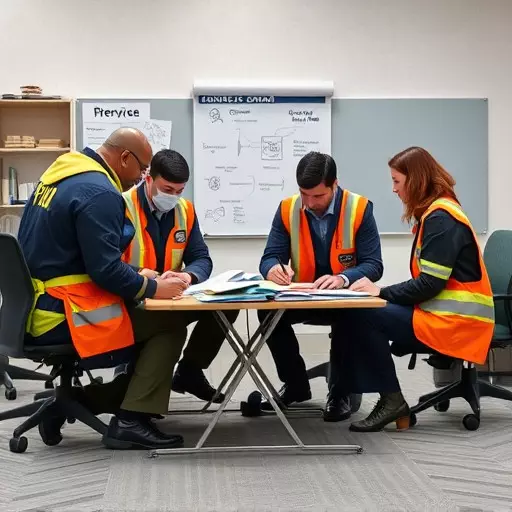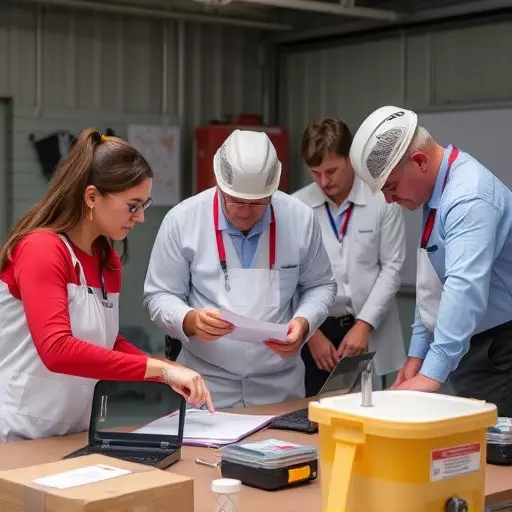Pre-PHA (Process Hazard Analysis) preparation is a vital risk management step, requiring specialized knowledge from PHA facilitation experts. These professionals utilize PHA facilitation tools and hazard identification techniques to identify, assess, and mitigate potential risks within complex processes. By combining data analysis, expert knowledge, and risk assessment tools, they ensure comprehensive analyses tailored to facility-specific needs. Their involvement enhances process safety, enables effective decision-making, and optimizes hazard management across industries.
In the realm of risk management, a Pre-PHA (Process Hazard Analysis) serves as a crucial step towards ensuring safety and preventing catastrophic events. This article guides you through essential preparation steps for an effective PHA, empowering organizations to mitigate risks. From understanding the fundamentals of Pre-PHA to leveraging pha facilitation experts and unlocking powerful hazard identification techniques, we provide a comprehensive roadmap. Additionally, we explore the vital role of pha facilitation tools in streamlining the process, ensuring a thorough and successful analysis.
- Understanding Pre-PHA: Setting the Stage for Effective Risk Management
- The Role of Pha Facilitation Experts: Why They Matter in PHA Preparation
- Unlocking Hazard Identification Techniques: A Comprehensive Approach
- Essential Pha Facilitation Tools: Streamlining the Preparation Process
- Practical Steps for Pre-PHA: A Roadmap to Success
Understanding Pre-PHA: Setting the Stage for Effective Risk Management
Understanding Pre-PHA is a critical step in setting the stage for effective risk management. It involves a comprehensive review and analysis of a facility or process to identify potential hazards and assess their impact. This proactive approach, guided by pha facilitation experts, leverages specialized pha facilitation tools to ensure a thorough examination. By employing robust hazard identification techniques, organizations can uncover hidden risks, anticipate challenges, and implement tailored mitigation strategies.
Pre-PHA preparation is not merely a checklist exercise; it’s a strategic process that empowers professionals to make informed decisions. It involves engaging key stakeholders, documenting existing controls, and evaluating them against regulatory standards and industry best practices. This holistic perspective enables the team to address vulnerabilities proactively, enhancing overall safety and operational efficiency.
The Role of Pha Facilitation Experts: Why They Matter in PHA Preparation
The role of PHA facilitation experts is pivotal in the preparation process for a Process Hazard Analysis (PHA). These specialists possess in-depth knowledge and experience in applying PHA facilitation tools and hazard identification techniques. They play a crucial part in guiding organizations through the complex landscape of process safety, ensuring that PHAs are conducted systematically and effectively.
With their expertise, pha facilitation experts can tailor the analysis to the specific needs and operations of the facility. They facilitate discussions, provide insights on potential hazards, and help identify root causes, ultimately enhancing the accuracy and comprehensiveness of the PHA. Their involvement guarantees that the process is well-structured, allowing for better risk management strategies and informed decision-making.
Unlocking Hazard Identification Techniques: A Comprehensive Approach
In the realm of pre-PHA (Process Hazard Analysis) preparation, unlocking effective hazard identification techniques is a crucial step facilitated by experienced professionals. These experts leverage a diverse set of tools to ensure a comprehensive approach, delving into every nook and cranny of a process to uncover potential risks. By employing these advanced methods, they can navigate complex systems, identify hidden hazards, and provide valuable insights that drive informed decision-making.
PHA facilitation experts emphasize the importance of a systematic methodology, which involves a combination of data analysis, expert knowledge, and risk assessment tools. This holistic strategy ensures that no stone is left unturned in identifying and quantifying risks. Through these techniques, organizations can gain a profound understanding of their processes, ultimately enhancing their ability to mitigate and manage potential hazards effectively.
Essential Pha Facilitation Tools: Streamlining the Preparation Process
In the realm of pre-PHA (Pre-Project Hazard Analysis) preparation, pha facilitation experts rely on a robust set of tools to streamline the process and ensure thoroughness. These pha facilitation tools are designed to enhance efficiency and accuracy during hazard identification techniques, which are crucial for any project’s safety protocol. By leveraging these resources effectively, teams can navigate complex scenarios with confidence, identifying potential risks and implementing mitigation strategies proactively.
Among these tools, digital risk assessment platforms stand out for their capability to centralize data and streamline workflow. They offer intuitive interfaces that facilitate the input of critical information, enabling faster analysis and decision-making. Additionally, standardized checklists and templates streamline documentation, ensuring consistency across different projects. These pha facilitation tools not only simplify tasks but also promote knowledge sharing among team members, fostering a culture of safety and continuous improvement.
Practical Steps for Pre-PHA: A Roadmap to Success
Pre-PHA preparation is a critical phase that sets the stage for successful hazard identification and risk management. It’s not just about ticking boxes; it involves a strategic approach that leverages pha facilitation tools and the expertise of pha facilitation experts. These professionals guide organizations through a structured process, ensuring every detail is considered.
The journey begins with assembling a competent team, equipped with a solid understanding of the PHA process and industry-specific knowledge. This team then delves into comprehensive documentation, reviewing existing data, procedures, and safety records. They employ advanced hazard identification techniques to unearth potential risks, analyzing systems, processes, and work environments. By combining these insights with expert guidance, organizations can effectively navigate the complexities of pre-PHA preparation, paving the way for a robust risk assessment and mitigation strategy.


